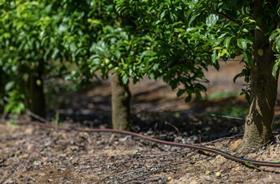
Fuelled by the trend of healthy diets and superfoods, avocados have seen a meteoric rise in demand.For a high-value crop like avocados, even a small increase in yield can make a big difference in the profitability of the crop, according to Israeli irrigation specialist Netafim.
Avocado plants have a wide and shallow root zone, with very low drought tolerance on the one hand, and high sensitivity to flooding or over-irrigation on the other, says Roei Yonai, Netafim’s head of strategic crops. Precision irrigation can therefore play a critical role, as frequent application of water and nutrients minimises plant stress and results in higher and better yields.
“Orchard yield is a combination of the number of fruits and their weight,” says Yonai. “In the race for higher yields, every fruit counts. Plant stress, caused by less-than-ideal weather conditions, often results in fruit drop. Precision irrigation helps moderate many environmental stress factors and thus helps to decrease fruit loss.”
It is common knowledge that nutrients are essential during all stages of fruit development, from bud initiation to harvest. Hence the need for consistent fertigation during the fruiting period.
“Even in winter, recent research by Silber et al suggests a high correlation between year-round fertigation and decrease in fruit loss, leading to significantly higher yields compared to conventional fertigation treatments,” says Yonai. “The mechanism behind this is a rather complex biological process partly explained by the development of healthier and denser foliage that serves as a nutrient ‘reservoir’ for the fruits’ future development.”
Biologically, year-round fertigation is the right thing to do but requires technical expertise. Fertilisers are delivered to the crop's roots using the drip irrigation system. The dilemma is how to irrigate the avocado plantation in conditions of low evapotranspiration and when there is sufficient precipitation. This is where 'technical irrigation' comes in.
“While ‘standard’ irrigation aims to deliver water (and nutrients) to the roots of the plant, technical irrigation uses a tiny amount of water (just enough to transport the fertilisers) with a high dosage of fertiliser,” says Yonai. “Thus fertiliser application is optimised, even when irrigation is not required.”
Netafim, a pioneer and world leader in the development of precision irrigation, was founded in the Israeli desert in 1965, with the goal of successfully growing agricultural crops in the desert soil. The company has been active in developing products specific to a wide range of crops that benefit from irrigation both in yield and quality.
“The company invests unremitting efforts in research and development, aiming to bring the best and most advanced irrigation solutions to farmers worldwide,” says Yonai. “Understanding that agricultural projects are a business and should be managed as a business, Netafim’s approach offers the best in market irrigation products, backed by complete A-to-Z project support for customers, from feasibility tests and detailed planning through to execution and ongoing technical and agronomical support.”



